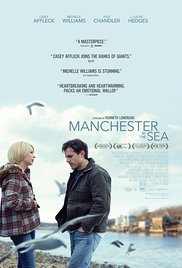
Robert McKee’s WORKS / DOESN’T WORK Film Review:
Manchester by the Sea (2016) | Written and Directed by Kenneth Lonergan
McKee Says: It Works (Spoiler Alert!)
Inciting Incident via Flashback:
Most stories unfold chronologically and so cause and effect happen in that order. The first scenes set up the protagonist’s life and arouse curiosity about the future: “What will happen to this character?” These set-up scenes build to the story’s first major event, the Inciting Incident, this powerful cause triggers the effects that play out in the scenes that follow.
The genius of MANCHESTER BY THE SEA reverses cause and effect, putting the effect before the cause, the cause after the effect.
When the film opens, we meet the protagonist, Lee Chandler (Casey Affleck), living a deeply troubled, virtually masochistic life. But we don’t know why, and so we naturally wonder, “What happened to this guy?” When our curiosity reaches the boiling point, the film flashes back to the Inciting Incident. This stunning turning point reveals the cause for Chandler’s silent torment and raises the major dramatic question: “Will he survive this tragic trauma or be destroyed by it?”
Superb Execution of the Evolution Plot:
The film dramatizes a rich, complex tale of the soul-destroying power of guilt. The event revealed in the flashback hollows out the protagonist’s humanity and launches a character arc that evolves from the negative (an unlivable inner life) to the positive (a livable inner life).
Memorable Character:
As in other wonderful films like 45 YEARS and the more recent 20TH CENTURY WOMEN, Kenneth Lonergan’s work unfolds like a novel by compelling us into the abyss of the protagonist’s unspoken turmoil, but does so by implication, not explanation. In other words, the story’s spine of action runs through the subtext, not the text, and therefore calls for an actor who can bring the unsaid and the unsayable to life without the aid of on-the-nose dialogue. Casey Affleck’s brilliant portrayal of the war within earned his Oscar nomination and my applause.
And finally for you writers:
I’m frequently asked questions about the placement of a story’s first major event: “Can the inciting incident happen in the backstory? If so, could I flashback to it? Or, could I just leave it there and only imply it?” All such questions get the same answer: “Of course.” A writer can tell her story any way she likes, so long as she knows why she’s telling the story her way and how her choices make her story all the better.
The first half of the following Storylogue Q&A addresses this exact question: Flashbacks: The Question is “Why?”